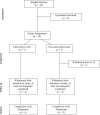Feasibility of Cognitive Training to Promote Recovery in Cancer-Related Cognitive Impairment in Adolescent and Young Adult Patients
- PMID: 34672806
- PMCID: PMC9464087
- DOI: 10.1089/jayao.2021.0055
Feasibility of Cognitive Training to Promote Recovery in Cancer-Related Cognitive Impairment in Adolescent and Young Adult Patients
Abstract
Background: Computer-based cognitive rehabilitation programs may help adolescent and young adult (AYA) patients with cancer-related cognitive impairment. This pilot study investigated the feasibility of cognitive rehabilitation as a preventive intervention for AYA patients receiving chemotherapy. Explorative objectives included the correlation of cognitive performance with serum brain-derived neurotrophic factor (BDNF). Methods: This pilot prospective study included English-speaking patients 12-25 years of age with a fist diagnosis of cancer requiring chemotherapy. Participants enrolled in the intervention arm participated in a computer-based neurocognitive training program for 20-30 minutes daily for 16 weeks. Outcome measures, including engagement with and completion of computerized neurocognitive testing and serum BDNF levels, were obtained within the first month following diagnosis, ∼16 and 24 weeks from enrollment. Results: Fourteen of 18 eligible patients provided consent, with 7 patients assigned to each the intervention arm and nonintervention arm. Seventy-one percent of the patients in the intervention arm completed at least 80% of the required activities. Compared to baseline, patients in the nonintervention arm demonstrated higher prevalence of impairment in four of the six cognitive domains (processing speed, visual attention, attention/working memory, and executive function) at the end of the study period. There was a nonstatistically significant reduction of serum BDNF levels over time, which was observed in both intervention and nonintervention arms. Conclusion: This pilot study provides some evidence that it is feasible for AYAs with new cancer diagnoses to receive standardized cognitive rehabilitation. Patients receiving cognitive activities experienced less impairment in numerous cognitive domains.
Keywords: adolescent and young adult; brain-derived neurotrophic factor; cancer-related cognitive impairment; cognitive rehabilitation.
Conflict of interest statement
No competing financial interests exist.
Similar articles
-
Effects of macular xanthophyll supplementation on brain-derived neurotrophic factor, pro-inflammatory cytokines, and cognitive performance.Physiol Behav. 2019 Nov 1;211:112650. doi: 10.1016/j.physbeh.2019.112650. Epub 2019 Aug 16. Physiol Behav. 2019. PMID: 31425700 Clinical Trial.
-
Does cognitive training improve attention/working memory in persons with MS? A pilot study using the Cogmed Working Memory Training program.Mult Scler Relat Disord. 2021 Apr;49:102770. doi: 10.1016/j.msard.2021.102770. Epub 2021 Jan 17. Mult Scler Relat Disord. 2021. PMID: 33497850 Clinical Trial.
-
How to Train an Injured Brain? A Pilot Feasibility Study of Home-Based Computerized Cognitive Training.Games Health J. 2017 Feb;6(1):28-38. doi: 10.1089/g4h.2016.0043. Epub 2016 Dec 19. Games Health J. 2017. PMID: 27991840
-
Cancer-related cognitive impairment: an update on state of the art, detection, and management strategies in cancer survivors.Ann Oncol. 2019 Dec 1;30(12):1925-1940. doi: 10.1093/annonc/mdz410. Ann Oncol. 2019. PMID: 31617564 Free PMC article. Review.
-
Peripheral inflammatory and neurotrophic biomarkers of cognitive impairment in schizophrenia: a meta-analysis.Psychol Med. 2019 Sep;49(12):1971-1979. doi: 10.1017/S0033291719001685. Epub 2019 Jul 9. Psychol Med. 2019. PMID: 31284882 Review.
Cited by
-
BDNF Augmentation Using Riluzole Reverses Doxorubicin-Induced Decline in Cognitive Function and Neurogenesis.Neurotherapeutics. 2023 Apr;20(3):838-852. doi: 10.1007/s13311-022-01339-z. Epub 2023 Jan 31. Neurotherapeutics. 2023. PMID: 36720792 Free PMC article.
-
Young Adults' Lived Experiences with Cancer-Related Cognitive Impairment: An Exploratory Qualitative Study.Curr Oncol. 2023 Jun 9;30(6):5593-5614. doi: 10.3390/curroncol30060422. Curr Oncol. 2023. PMID: 37366905 Free PMC article.
-
Adolescents and Young Adults With Cancer: CNS Tumors.J Clin Oncol. 2024 Feb 20;42(6):686-695. doi: 10.1200/JCO.23.01747. Epub 2023 Dec 8. J Clin Oncol. 2024. PMID: 38064656 Free PMC article. Review.
References
-
- Sender L, Zabokrtsky KB. Adolescent and young adult patients with cancer: a milieu of unique features. Nat Rev Clin Oncol. 2015;12(8):465–80. - PubMed
-
- Howlader N, Noone AM, Krapcho M, et al. SEER Cancer Statistics Review, 1975–2018. Bethesda, MD: National Cancer Institute; 2021.
-
- John TD, Sender LS, Bota DA. Cognitive impairment in survivors of adolescent and early young adult onset non-CNS cancers: does chemotherapy play a role? J Adolesc Young Adult Oncol. 2016;5(3):226–31. - PubMed


